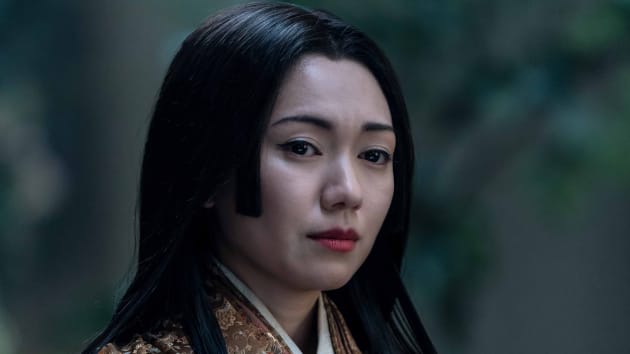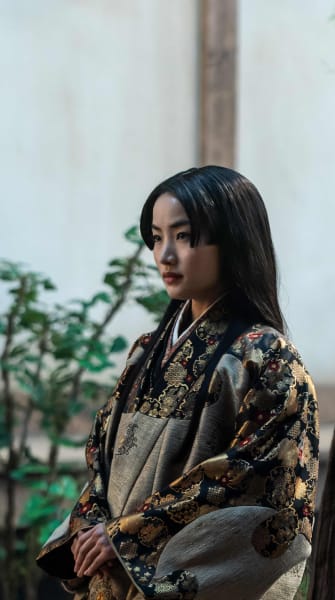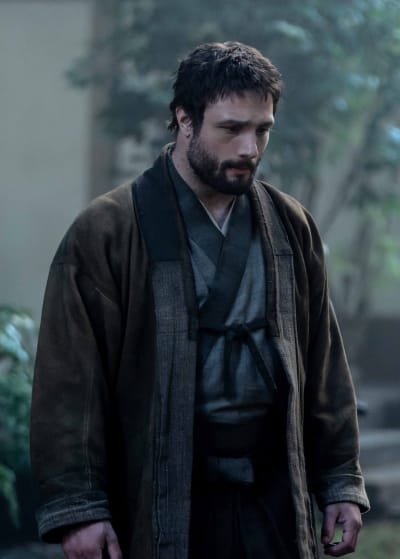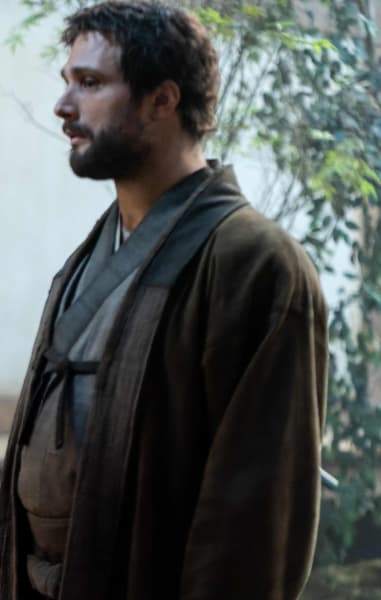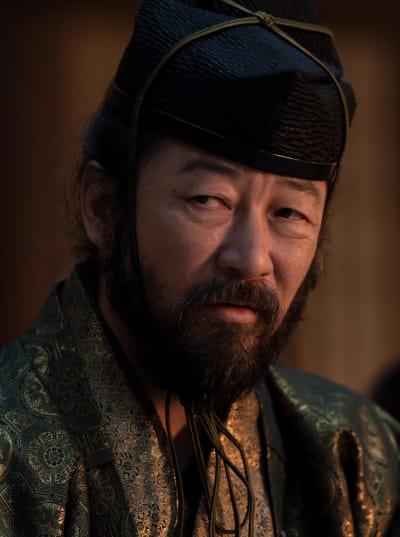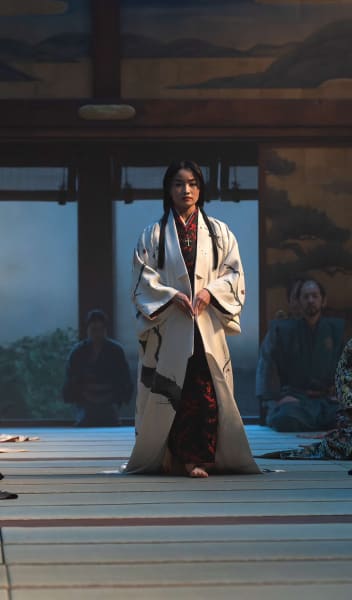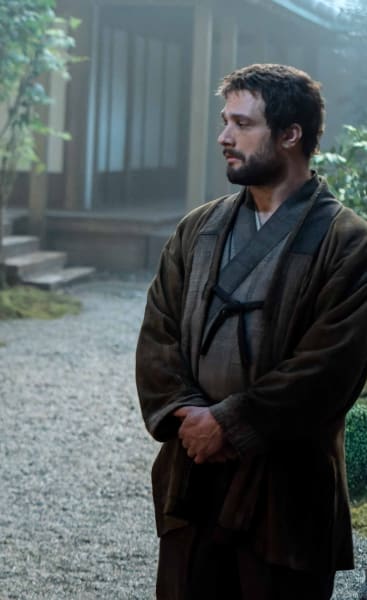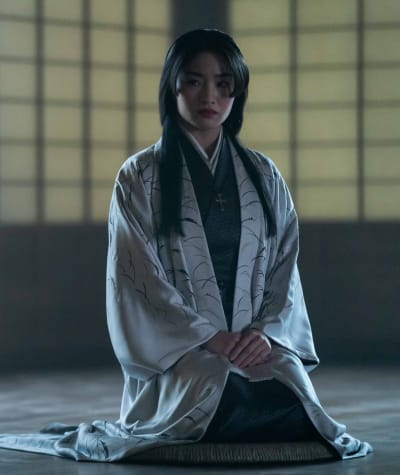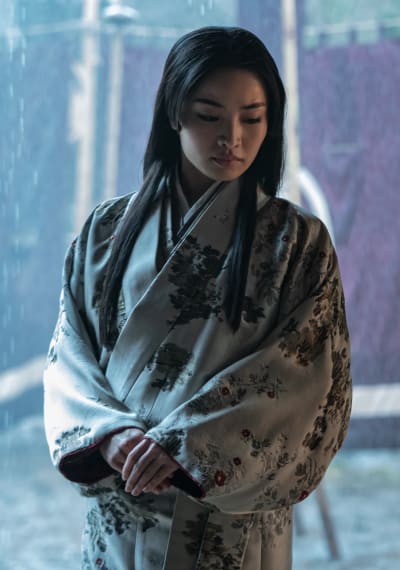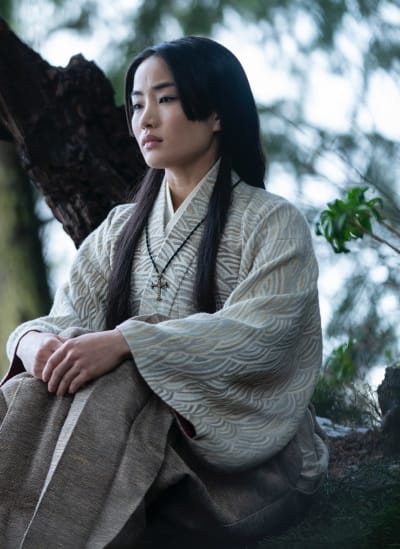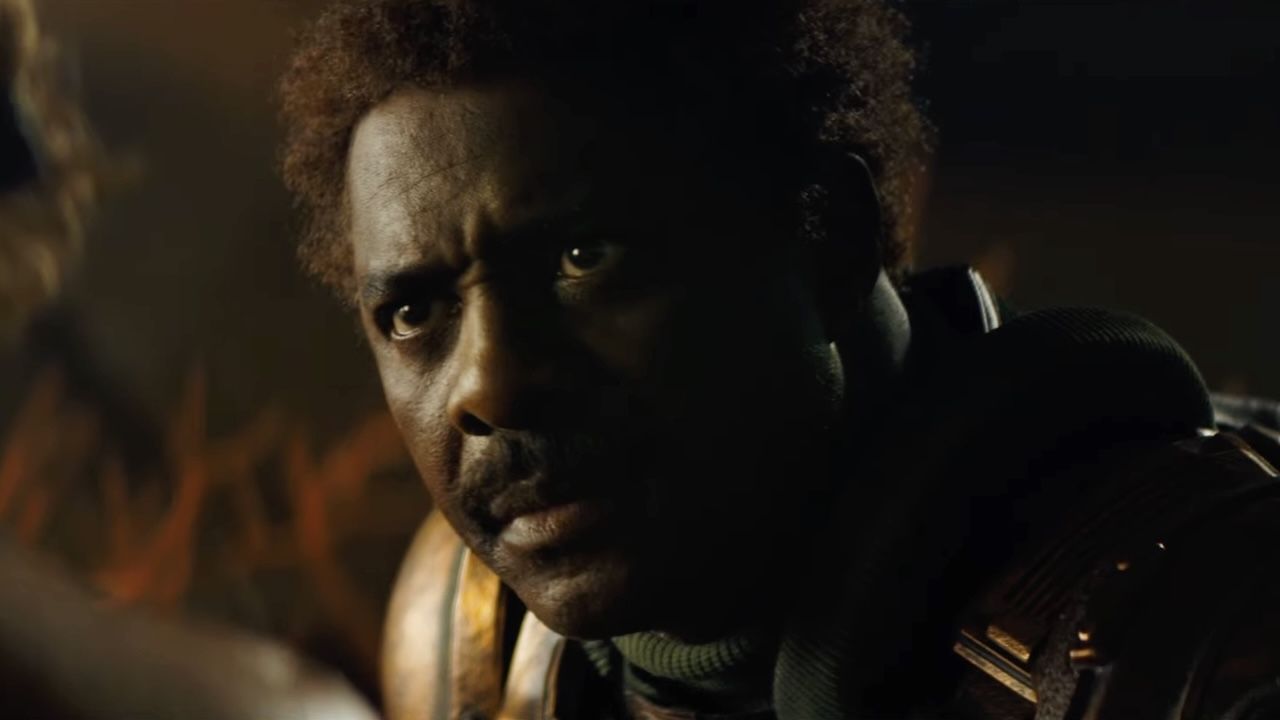Every time there’s a flashback involving Mariko, a new layer of tragedy is added to her story.
This time, we’re reminded that her sadly understandable desire to take her own life has persisted for several years — 14, to be exact — and it did not relent during her pregnancy.
But we see more than just pain and misery during this latest look into Mariko’s past.
We see the foundations of her religious faith, as well as the emergence of two traits that will serve her well later in life — her resilience and her facility with language.
While Toranaga and Blackthorne might occasionally claim center stage for themselves, Shogun is Mariko’s story as much as anyone else’s, and her perseverance and translation skills have enabled her to serve as the bridge that unites the two men’s worlds.
As Shogun Season 1 Episode 9 returns us to 1600, Mariko attempts to convince Blackthorne that it’s mere coincidence that duty has called them both to Osaka at the same time, but he’s not fooled.
He’s also not convinced that the Catholic missionaries who taught her English have been motivated by anything other than their own financial interests.
At this point, Yabushige also has his doubts about Mariko’s loyalties and intentions, and from a storytelling standpoint, it’s no surprise that no one trusts anyone.
We’re in the second-to-last episode here, and its title, Crimson Sky, is a reference to Toranaga’s plan for an invasion of Osaka.
A bit of a spoiler ahead of next week’s finale, perhaps, but we’re guessing most viewers knew from the moment that plan was mentioned that some version of it would eventually be carried out.
Even though she no longer feels much loyalty to Blackthorne, Mariko can still be relied upon to deliver some helpful exposition, this time informing him (and the viewer) that Ishido is holding hostage a member of each noble family for protection purposes.
Yabushige and Blackthorne are a little less clear in their communications, but their alliance remains intact regardless.
The scene in which both men refuse Mariko’s translations while saying their piece offers a subtly potent reminder of the ways in which alliances have shifted due to recent events.
Once again, it’s the women in general — and Mariko in particular — who are really in the know and aware of what’s coming next.
Without ever bludgeoning us over the head with heavy-handed feminist messages, Shogun has amusingly returned over and over to the idea that while the men rush into one mess after another, their female counterparts watch, wait, and quietly keep society from going off the rails.
There’s no clearer example of this phenomenon than the bromance between Blackthorne and Yabushige, which progresses without either having much idea of what the other is saying — or what tricks Toranaga has up his sleeve.
Mariko, of course, knows all.
The reception in Osaka serves as a reminder that without support from Toranaga, Blackthorne is the most vulnerable man in Japan.
Yabushige might be happy to teach his new friend how to bow, but he’s not gonna stick his neck out and defend the Anjin against allegations of piracy.
And without Mariko to translate, Blackthorne is mostly ignorant of the ways in which his stock has plummeted. He’s gone from hatamoto back to barbarian, and the next demotion might involve a sharp blade.
Ishido might be the most ruthless character in a show that’s full of them, and his engagement to Ochiba — reluctant though she may have been to enter it — has brought him to new heights of power.
But feudal Japan is a society that places tremendous value on tradition and etiquette — one in which the ability to manipulate social situations is the ultimate strength.
And no one is as skilled in that regard as Mariko, who poignantly chides Ishido for his lack of manners while informing him that she’ll soon be departing Osaka with Toranaga’s captive consorts (and infant son).
I am no peasant to be trodden upon. I am daughter of the great Lord Akechi Jinsai.
The politics of Shogun tend to be more subtle and intricate than those of Game of Thrones (the predecessor to which this series is most often compared), but there’s nothing low-key about Mariko’s declaration that she’s a badass samurai from a long line of them — and she’ll therefore come and go as she pleases.
Fortunately, the moment felt entirely organic and made perfect sense in the context of the beleaguered translator’s evolution.
Yabushige, of course, is incensed to learn that he’s been left out of Toranaga’s master plan, and he wants to know the details.
But Mariko is the embodiment of the discipline and self-mastery that are so prized in her society, so she has no trouble biting her tongue when the situation calls for it.
The opening flashback did a masterful job of speaking volumes about Mariko’s past as well as her current situation, reminding us at once about her father’s travails and the fact that she’s a mother.
Both directions of her lineage are on her mind now, as she learns that her (westernized, English-speaking) son has betrayed Toranaga by agreeing to marry the daughter of Kiyama, a fellow Christian.
She’s not afraid of being held against her will if she tries to leave Osaka, as such a move by Ishido would only prove her point — but she does fear suffering yet another family tragedy by being cut off by her son.
Of course, Mariko’s loyalty to Toranaga knows no bounds, and while she might have a talent for navigating tricky political terrain, her talents are not limited to charm and guile.
So when she takes up arms against her captors, it’s no mere bluff.
From a fighting standpoint, it’s a lost cause, but like her liege lord Toranaga, Mariko’s agenda is always more complex than it seems.
When she complains of the men standing in her way, she’s speaking literally, but she’s also bemoaning her place in society.
And while she’s been flirting with suicide for years, when she threatens to take her own life at sunset, we sense that there’s more going on here than simple despair.
By asking her fellow Christian Kiyama to assist with her seppuku, Mariko has arranged yet another intricate social trap — the mores of 17th-century Japanese culture have come into conflict with the core tenets of Christianity, and Kiyama is caught in the middle.
But again, as Ochiba points out, this is no mere bluff. Mariko might be using her opponents’ belief system against them, but she holds the same views, and she’s more than willing to die for them.
Accepting death isn’t surrender. Flowers are only flowers because they fall.
Mariko
Ochiba arranges to meet with Mariko and confirms during their conversation that the latter’s talent for managing difficult social situations has long been envied by others.
But ironically, during the same exchange Ochiba, reveals that her own manipulation skills are almost on par.
Mariko’s greatest weakness is her desire to become a martyr, and here, she explains its origins and makes her case for why it’s actually a strength.
Whether or not you find that argument convincing, there’s no denying that Mariko believes it — and it’s another core part of her system of values that’s informed by her commitment to the ideals of honor and duty.
Blackthorne sullying the symmetry of a Buddhist rock garden; Mariko wearing a cross at her seppuku ceremony — the haunting scenes that follow are loaded with reminders of the clash of cultures at the heart of this story — the clash that these two conflicted companions embody so fully.
Now, Shogun is a TV series that’s a cut above the rest, a reminder of the potential of the medium that recalls the Peak TV era of yesteryear — but it’s still a TV show.
It’s surprised us several times in the past, but we’re guessing very few viewers believed that Mariko would be killed off in such an ignominious fashion, and their skepticism was rewarded by a last-second intervention from Ishido.
Once again, it appears that Mariko has emerged victorious. It nearly cost her everything, but Ishido was forced to grant her her freedom! All’s well that ends well, right?
Well, like Toranaga, this show always has some tricks up its sleeve, and it wouldn’t be an episode of Shogun if it didn’t deliver one more big blow before the closing credits.
And this one subverted our expectations like few other moments in recent TV history.
We predicted that a Toranaga-less episode titled Crimson Sky to feature an invasion — but we figured it would be the good guys swooping in to save the day.
Instead, Ishido’s men storm the castle in search of Mariko — who appears to go out in a righteous blaze of self-sacrifice.
It’s important to note that her death remains unconfirmed, but the episode seems to conclude in absolutely astonishing fashion — with the death of a character who is arguably Shogun’s moral center.
We went into this installment thinking we’d see the titular invasion.
Instead, it depicted the events that would bring the two opposing factions to the point of no return.
Rarely have we had any luck in predicting Toranaga’s next move, but something tells us that he won’t allow the death of his most loyal vassal to go unpunished.
And with only one episode of Shogun remaining, it seems certain that the clash between the regents will soon come to a very violent conclusion.
What do you think, TV fanatics? Could the stakes be any higher ahead of next week’s finale? Hit the comments section below to share your thoughts.
Tyler Johnson is an Associate Editor for TV Fanatic and the other Mediavine O&O sites. In his spare time, he enjoys reading, cooking, and, of course, watching TV. You can Follow him on X and email him here at TV Fanatic.

